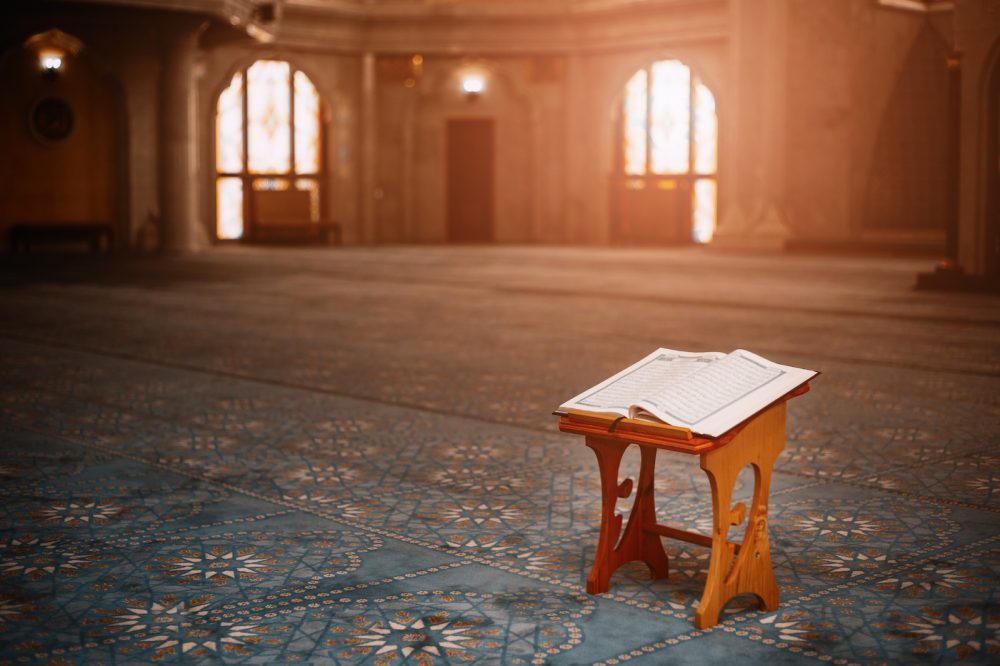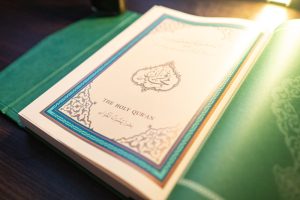
© Shutterstock
In the previous edition, we explored the deeper meanings of why Allah used the command ‘Say’ in the beginning of this chapter.
In this edition we look at why the last two chapters are not combined into one, despite seemingly containing the same subject matter.
Translated by Murtaza Ahmad
Edited byThe Review of Religions Translation Team
The word أَعُوذُ ‘I seek refuge’ appears at the beginning of both the chapters al-Falaq and al-Nās, which mean that they both include the subject matter of the manner in which a person seeks refuge in God Almighty. Here, the question that naturally arises is: When both chapters contain the same subject matter, why were the two chapters not combined into one? Why have they been separated?
One must bear in mind that the chapter al-Falaq focuses more on teaching a prayer to avert the evils of the rest of creation, aside from those created by man, and chapter al-Nās mainly deals with teaching us to seek refuge from the evils that originate from man. As these are two distinct topics, they were mentioned in two separate chapters. God Almighty said, قُلْ أَعُوذُ بِرَبِّ الْفَلَقِ ‘Say, I seek refuge with the Rabb of al-Falaq.’ In قُلْ أَعُوذُ بِرَبِّ الْفَلَقِ the word Rabb refers to the Being Who gradually nurtures a person, developing him until he develops him to perfection. The seven meanings of al-Falaq have already been cited in the Lexical Analysis, [see June 2023 edition] and all of them apply here.
1: The first meaning of al-Falaq is الصُّبْحُ [the dawn], and accordingly, رَبّ الْفَلَقِ means ‘the Lord of the Dawn.’ And قُلْ اعُوذُ بِرَبِّ الْفَلَقِ means ‘Say, I seek refuge with the Lord of the break of dawn’.
As I have already explained at the beginning of chapter al-Falaq’s commentary [See June 2023 edition] that this chapter relates with chapter an-Naṣr, in which it has been made clear that the foundation of Islam’s citadel of successes and victories, which was laid by the hands of the Holy Prophet (sa), will continue to prosper and flourish until it is completed, and if ever an obstacle is encountered, it will be blown away like dry leaves by God Almighty. In chapter al-Falaq, Muslims are taught to pray that Allah Almighty progresses their victories and successes to culmination, and to pray that their victory lasts forever, lest the enemy stand in their way and damages their citadel of triumph, or creates a rift among them, such that they are prevented from protecting it.
The Holy Prophet (sa) lived in Makkah for thirteen years. It was an era of darkness in terms of the hardship and the trials and tribulations he endured, however, thereafter, he migrated to Madinah. Subsequently, the dawn of prosperity began to appear. The footprint and influence of Islam’s successes started to become visible on the one hand, and on the other, the hardships and suffering waned. It was like the early morning light which was not fully apparent, which a weak-sighted person could not perceive but a highly perceptive person could; he is glad and also hopeful that very soon the sun’s light would become visible to all, until eventually the sun would begin to shine as brightly as it does midday [at its zenith].
The dawn of the Muslims came after their migration to Madinah, and although the Muslims were now expectant of dawn finally breaking and they believed that soon light would spread across the horizon, the eyes of the opponents could not perceive this. Ultimately, the light began to appear, and the Muslims began to prevail until Makkah was conquered in the eighth year of Hijrah, and the light of Islam illuminated the Arabs. And thus, everyone began to witness the dawn break of Islam. In reference to such a time, Allah Almighty instructed that Prophet Muḥammad (sa) should take refuge with Rabb al-Falaq [Lord of the Dawn] and, similarly, that he should instruct all members of his Ummah to seek refuge with Rabb al-Falaq [Lord of the dawn]. On the one hand, the words Rabb al-Falaq indicate that the Muslims should pray that the sun of Islam should gradually rise until it reaches the zenith and dazzles the eyes of the people with its brilliance. On the other, it highlights that during this time of prosperity, Muslims should continue to seek God Almighty’s protection from falling into disarray, decline and failure.
The Holy Qur’an has addressed the believers as well as the disbelievers. In this verse, where Allah Almighty gives glad tidings to the Muslims, He also reminds the disbelievers about their objection that if Muḥammad (sa), i.e. was really the sun, then his light should be shining forth. It is as if God Almighty is saying: ‘Now the light of Our sun is about to be revealed, and all the spiritual and secular knowledge which hitherto was hidden will become apparent, and the transgressions and bad condition of the people which were concealed by the dark will become revealed and visible by virtue of this light. And now the people of the world would attain material progress and advancement, which they were previously devoid of. As the sun rises, there is a sense of awakening among the people. People begin to occupy themselves in various kinds of work for the sake of their progress. Then the defects and faults of things as well as their beauty which was hidden in the dark, will start to become noticeable. In the darkness of the night, the unpleasant is equal to the things of beauty; one cannot distinguish between the two. In the dark, all colours: red, white, black, yellow, blue and brown appear the same, but as the sun rises, these colours become distinct. The evil of the dreadful and the beauty of the beautiful start to become distinguished.
Here, Allah Almighty disclosed that with the completion of the Holy Qur’an, the spiritual sun will rise to its zenith. This would sharpen the intellect, and through this, the beauty and ugliness of things shall become apparent, and the doors of success will be opened to those who avail from this Sun; that is, the Muslims would make all kinds of progress in power, honour and prestige, trade, and industry etc. But the Muslims should bear in mind that just as light is accompanied by blessings, so, too, it brings afflictions. Man is faced with and enticed by various hues of beauties that seek to lead him astray from the true path. Similarly, light is not only a means of benefit but also a means of detriment. Therefore, Allah alludes to the fact that the rising sun of Islam may expose many of their faults, defects, and shortcomings because secular advancement creates in one’s heart an affinity with comfort, ease and luxury. As the desire to utilise one’s wealth unlawfully arises in one’s heart, so too can one’s knowledge of spirituality of which the rest of the world is deprived, lead one to arrogance and self-conceit. Similarly, spiritual and material dangers can arise. That is to say advancing in spiritual knowledge may lead one to self-conceit while material advancement can lead one to indulging in luxury. Hence why Allah declares: قُلْ اعُوذُ بِرَبِّ الْفَلَقِ ‘Say, I seek refuge with the Rabb of al-Falaq.’ This means that the morning will inevitably come, and the Muslims will make intellectual and spiritual progress. The sun [of victory] will surely rise, but there looms the danger that this progress may have disastrous consequences. That is, the question is no longer how the Muslims would attain progress, but rather, the only fear now is lest they should face trials by virtue of the progress they have achieved. Therefore, a prayer is taught to the Muslims to seek refuge with Allah Almighty from the evils of all those things which He has created. Thus, مِنْ شَرِّ مَا خَلَقَ indicates that the Muslims will achieve everything because the supplication draws their attention to seek protection against the evil of all things.
Only one who already has everything in their possession would seek protection against the evil of all things. If one does not consume meat, one does not need to take corrective measures to be protected from its harms. So, when Allah Almighty states:
قُلْ اعُوذُ بِرَبِّ الْفَلَقِ * مِنْ شَرِّ مَا خَلَقَ
this means, ‘I seek refuge with Rabb al-Falaq.’ i.e. He Who brings forth the morning, and causes the sun to rise. Min Sharri mā Khalaq That is, ‘and from the evil of that which He has created.’ Here, it is disclosed that the Muslims would be bestowed everything, which means that they would partake of all the blessings created by Allah Almighty in this world and that there would be no success in the world that they cannot expect to achieve. This suggests that their growth and progress would be exponential. Therefore, Allah Almighty instructs Prophet Muḥammad (sa) to start praying for the Muslims from now on, so that when they achieve success and prosperity, Allah safeguards them against all kinds of evil and negative outcomes.
The serialisation of Surah al-Falaq will continue in the next edition.




Add Comment